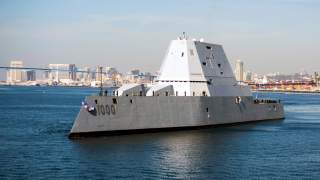With Futuristic Weapons, The Navy's Zumwalt Stealth Destroyer Will Be A Real Monster
Lasers, railguns, and stealth.
Key point: The Zumwalt will significantly enhance the available firepower for littoral operations.
As the USS Zumwalt progresses with combat activation, weapons integration and further preparations for operational combat, the Navy continues to more broadly scope its operational envelope and envision operations previously less emphasized mission areas for the ship.
Could the new destroyer actually wind up changing surface warfare?
While initially conceived, in large measure, as a littoral land attack platform, Navy program managers now say fast-progressing technology and the ship's performance thus far, will increasingly enable it to succeed in open or "blue water" combat should it engage is major power, force-on-force ocean warfare.
Given its stealthy configuration, it seems plausible that a Zumwalt class ship could lead an assault or help launch a broader attack by virtue of an ability to strike while avoiding detection. The three-ship Zumwalt fleet is likely to be in great demand in coming years as new threats emerge which present a need for its emerging technologies.
Also, in a manner quite similar to the current fleet of DDG 51 destroyers, a Zumwalt will almost certainly help protect a carrier strike group. Drawing upon its stealthy configuration, a Zumwalt destroyer might be well positioned to test or penetrate blue-water enemy defenses without necessarily surrendering the location of a carrier group.
If radar, aerial ISR or on-board MH-60Rs and Fire Scout drone assets detect long range threats or areas of incoming enemy fire, the Zumwalt could very well be called upon as a launching point for a counterattack. With its long-range precision gunfire technology, a Zumwalt could perhaps be successful in attacking more fortified enemy land targets without itself being as susceptible to land-based sensors and anti-ship missiles. The concept with the Zumwalt’s Long Range Land Attack Projectile, or LRLAP, is to bring offensive precision and firepower well beyond the range of today’s unguided, deck-mounted 5-inch guns.Furthermore, given its low radar signature, it might not seem like too much of a mission stretch to envision a Zumwalt-class destroyer as an element of an amphibious assault. Advanced on-board sensors could connect with drones and other ISR assets to help orient an approaching Amphibious Ready Group as to the best methods or locations of attack.
A Zumwalt’s shallow draft, littoral mission abilities and long-range precision fires could, in tandem with air power, help soften land targets in preparation for an amphibious landing. In a manner not entirely unlike an LCS, a Zumwalt could access shallow water ports and other coastal areas currently inaccessible to deeper draft vessels; this changes the combat calculus in that brings substantially enhanced surface firepower to littoral operations.
At the same time, it is undoubtedly relevant to point out that, at least for the moment, will only be three Zumwalt class destroyers – a circumstance likely to limit a more ubiquitous global reach. As a result, it takes little imagination to observe how the Zumwalt-class is likely to function as an inspiration or model for other new ships and innovations, to emerge in the future, which may emulate or build upon some of its technologies.
The question of rail guns and lasers weapons, without surprise, is something which tends to generate much attention in the minds of innovators, threat assessment analysts and future planners; this is a key reason why many point to the Zumwalt’s Integrated Power System as an impactful mobile power source which, as it continues to evolve, provides the technical foundation for the integration of laser weapons.
The larger the amount of exportable, ruggedized mobile power technology, the stronger the laser. Ship-based laser weapons, it is widely discussed, are now operational. The challenge moving forward is to succeed in increasing their strength and range while accelerating its integration with radar, sensors and fire control technologies.
This article, which includes commentary and analysis from Kris Osborn, originally appeared on Warrior Maven. This first appeared several years ago.
Image: U.S. Navy Flickr.

